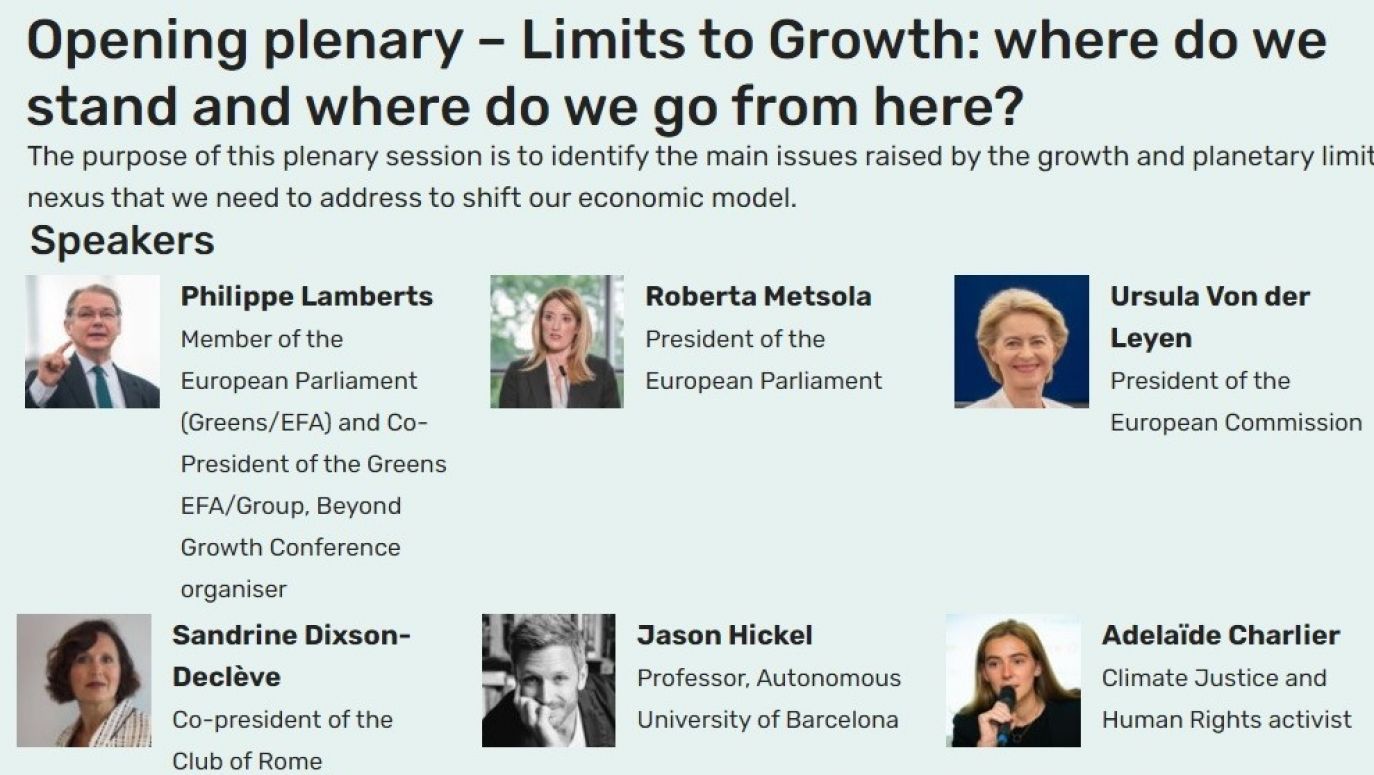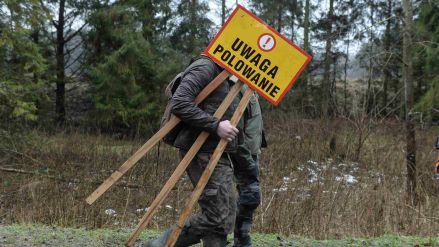Lamberts makes no secret of his delight at being able to convince the head of the European Commission and a number of commissioners to attend the three-day event. The previous conference on a similar theme in 2018 was attended by only one EU commissioner, and then President Juncker was tepid about the idea. Now, the head of the Commission is giving the opening speech, and the banners announcing the conference feature the logo of the European People's Party. What a change!
This does not, of course, imply a substantive agreement, about which Lamberts has not the slightest doubt. But that is not what he means. Until now, those carrying the idea of post-growth were treated as “dangerous radicals” or “frivolous dreamers”. Now, they are debating with the giants of European politics. They have the chance to make their arguments where European law is being made and – thanks to the activists who have signed up for the conference, they can feel at home there.
What made Ursula von der Leyen decide to let the radicals "into the heart of Europe"? At a time when climate activists are glueing themselves to road surfaces and paintings in galleries and – horror of horrors! – disrupting EU conferences, the head of the Commission wants to avoid the accusation that the European Union is in any way delaying the fight against climate change and is not energetic enough in saving the planet. After all, the whole “green deal” narrative is based on creating the perception that the Union is making a more radical turn towards a green future than ever before.
 SIGN UP TO OUR PAGE
SIGN UP TO OUR PAGE 
And just as this narrative is unfolding at its best, there are activists who want to convince the public that this radicalism is not radical enough and is turning in the wrong direction. Von der Leyen has decided to follow the old American saying: “if you can't beat them, join them”. It was preferable to pretend to be friends and make up their own story in an effort to undermine that of their opponent because an open fight would not have received well from the general public.
Extremely characteristic from this point of view were the two opening speeches by representatives of the two most important EU institutions. President of the European Parliament Roberta Metsola showed herself as someone who has no desire to flatter the audience and intends to defend her convictions. She uttered the much-hated word “growth” several times in her speech and added that this is something that the public expects and that politicians should provide for the people. Angry murmurs rang out from the upper rows.
Ursula von der Leyen chose a different path. She chose to replace the word “Beyond growth” with “Green growth” and joined the criticism of the notion of economic growth, but added an important caveat: “economic growth based on fossil fuels must come to an end”. She was also completely open that it all depends on who “wins the narrative”. The room clapped, Philippe Lambert smiled, but the answer for both women was already prepared.
After the opening speeches, three more speakers were invited, whose speeches had the value of cannon salvos designed to level the positions of the opponent, or in this case, the opponents. Interestingly, both Roberta Marsola and Ursula von der Leyen, unlike the usual case when high-ranking officers “honour the hosts with their presence”, make their speeches, and then slip off with an apologetic smile to other “urgent” activities, sat to the end and listened to what the adversaries had to say. Perhaps they wanted to show courtesy, perhaps they needed to show attention, or perhaps they wanted to hear in person how their message would be fleshed out.
The first speaker was Sandrine Dixson-Decleve, co-chair of the Club of Rome, from which the post-growth thinking began. In 1972, the Club published a famous book by a group of American scientists called The Limits to Growth, in which they posited that the Earth's resources were finite and that population would grow indefinitely, so sooner or later these resources would be exhausted.
On the one hand, however, their thought contained an assumption that was true, because if the Earth can be measured and weighed, it means that it is finite, and so are its resources. On the other hand, however, their predictions were based on faulty assumptions at many points, which made a number of predictions fail. In other words: will oil reserves run out? Someday, yes. But not in 1992, as we could see for ourselves, and as the authors of the book solemnly predicted.
Regardless of the specifics, The Limits to Growth has been a gigantic publishing success, with three million copies sold, and has introduced into our thinking the otherwise common-sense notion that we must consume the Earth's resources in moderation.
Although she was born in Belgium, Sandrine Dixson-Decleve thundered from the rostrum like La Pasionaria, calling on politicians to show “the will to change”, and responded to Metsola's words about growth by saying that people “don't want growth, they want security” and they needed a “New Marshall Plan”.
The second speaker was the rising star of progressive economics, Jason Hickel, the Swaziland-born and US-educated author of “Less is More: How Degrowth Will Save the World”. He called for the cancellation of unpayable debts to the IMF, which he encouraged, and proposed an extensive public works programme that he said would stabilise the economy and eliminate unemployment by ensuring that everyone continued to work on various construction sites. The young people listening to him seemed delighted, probably hoping that they would not be the ones pushing wheelbarrows on these construction sites.
He also listed a number of product categories whose production should be reduced or stopped because they are "totally insignificant to human wellbeing", among them beef, guns and advertising. The young people listening to him, with pleasant-looking faces, seemed delighted by this prospect. Probably most of them don't eat beef and are annoyed by the adverts, but stopping arms production when authoritarian regimes are arming themselves to the hilt seems far-fetched extravagance nonetheless.
I didn't see whether Philippe Lamberts applauded, but he probably did, and even if he didn't, in the end he was the one who decided that Hickel should be among the first to speak and present his views to the heads of important European institutions. How does he combine this with the resolutely anti-Putin stance of the European Greens? This is difficult to say.
Finally, the icing on the cake: the last person to convey her views to Metsola and von der Leyen was climate activist Adelaide Charlier, only slightly older than Greta Thunberg. She asked that young people not be shown “misleading maps of the future” because it is time to “move our nations from the shifting sands of unlimited economic growth to the hard ground of inclusive prosperity”. To the rhetorical question of when activists would be satisfied, she replied that “we will not be satisfied as long as the boundaries of the planet are not considered a horizon that cannot be crossed for the benefit of humans and other living organisms”. Which is to say, never.


 SIGN UP TO OUR PAGE
SIGN UP TO OUR PAGE 





